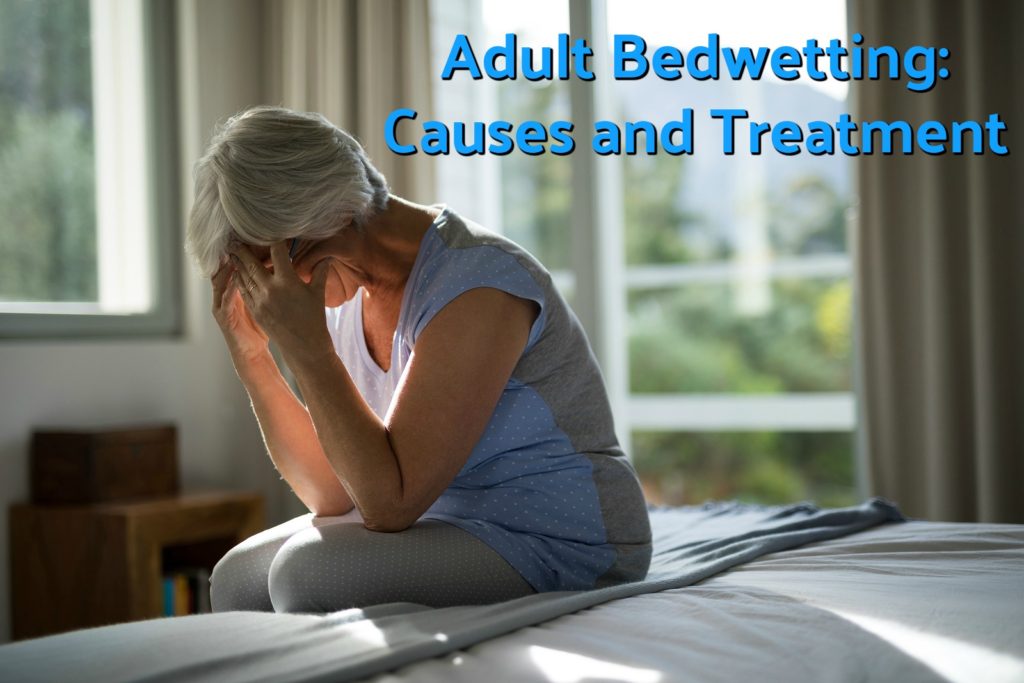Bedwetting, also referred to as sleep enuresis or urinary incontinence, is a normal occurrence in young children whose bladders are immature and still developing. An estimated 15 percent of children over the age of three, and 10 percent over the age of five will occasionally wet the bed. Pediatricians don’t usually consider bedwetting to be a problem unless the child is older than the age of seven or have begun to wet the bed again after six months or more of maintaining bladder control overnight.
Less common, and often undiscussed, is adult bedwetting. Wetting the bed as an adult can be a dreadfully embarrassing condition, but it also often indicates that the sufferer has an underlying illness or untreated medical condition. Though you may be embarrassed to talk about it, if you are an adult who wets the bed frequently, you should discuss your symptoms with your primary care physician (PCP) to get to the root of the problem.

Common Causes of Adult Sleep Enuresis in Adults
There are several medical conditions that can result in an adult wetting the bed including:
- Antidiuretic hormone (ADH) imbalance
- Bladder cancer
- Diabetes
- Enlarged prostate gland
- Genetics- family history of adult bedwetting
- Kidney disease
- Medication side effect
- Neurological disorders
- Prostate cancer
- Psychological issues
- Sleep apnea
- Small bladder
- Urinary tract infection (UTI)
Uncovering the Cause of Adult Sleep Enuresis
It could prove to be difficult to get to the root of your bedwetting problem, as it is usually a symptom of one of the conditions above. When you talk to your doctor about your sleep enuresis one or more of the following tests will likely be performed.
- Neurological examination
- Physical examination
- Ultrasound of the kidneys and bladder
- Urine tests
- Urologic examination
To give your doctor a better understanding of your specific circumstances and to help them correctly diagnose your condition, keep track of the following information and bring it to your next appointment:
- How much urine was voided
- Daily intake patterns of fluids (when you consumed fluids)
- Time your accidents usually occur
- Type of fluid ingested, did they contain alcohol or caffeine
- Number of dry nights vs number of nights with an accident
- Recent history of UTI’s
- Description of your urine stream when you use the restroom (is it strong and steady, or weak and trickling)
Treating Adult Sleep Enuresis
When it comes to treating bedwetting in adults, discovering and treating the underlying cause is the best solution. However, there are lifestyle and medical treatments that have proven to help.
Medical treatments for sleep enuresis typically involve a prescription medication such as:
- Antibiotics for urinary tract infections
- Anticholinergic drugs that ease an irritated bladder
- Desmopressin acetate to increase ADH levels and slow nighttime urine production
- DHT-blocking medications to reduce prostate swelling
Life style treatments for sleep enuresis include:
- Wearing absorbent underwear at night
- Protecting your bed with mattress covers
- Set an alarm to get up and use the restroom in the middle of the night
- Void your bladder before you go to bed, even if you don’t quite feel the urge to go
- Schedule to urinate every one to two hours throughout the day
- Reduce or cut out caffeine and alcohol intake
- Set limitations on the amount of fluid you intake, especially close to bedtime
Adult Sleep Enuresis and Sleep Apnea
In children, bedwetting is often a symptom of sleep apnea. For adults, though, it is a lot less common. However, there is still a small percentage of adult patients that experience sleep enuresis as their symptoms of sleep apnea worsen. One study states that seven percent of sleep apnea patients had secondary enuresis. These patients often find that the bedwetting resolves after continuous airway pressure therapy (CPAP) is introduced to treat their sleep apnea.
Experiencing bedwetting as an adult may be associated with worsening sleep apnea symptoms. If your doctor has ruled out other medical conditions, contact the Valley Sleep Center to schedule a sleep consultation to see if a sleep study may benefit you.

